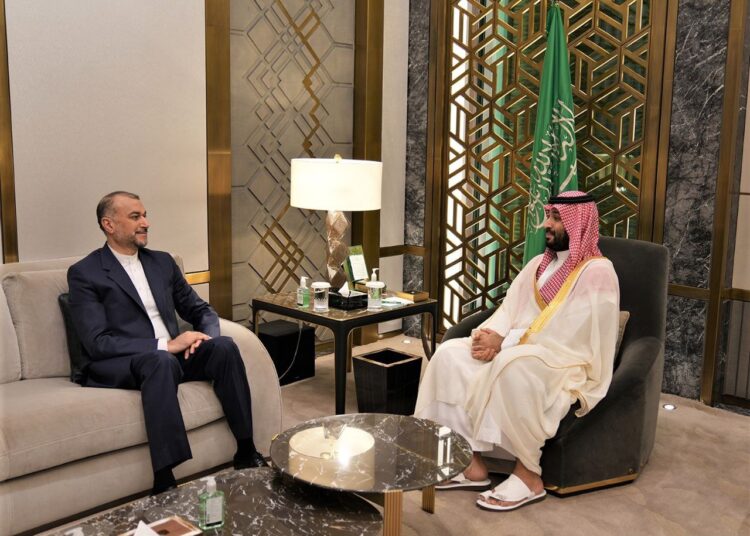An extended consultative dialogue encompassing five hours between Iran’s Foreign Minister Hossein Amirabdollahian, and Saudi Foreign Minister Faisal bin Farhan, Crown Prince Mohammed bin Salman signals a new chapter of relations between Tehran and Riyadh. With its duration and content, this dialogue sends an important message to regional as well as global actors.
In the course of this dialogue, Saudi Arabia’s influential figure, Mohammed bin Salman, extended salutations to the Iranian leadership, conveying Saudi Arabia’s vision of their ties with Iran as a strategic pursuit, backed by a resolute intent.
In underlining the significance of a visit by Iran’s president to Saudi Arabia, the Crown Prince of Saudi Arabia enunciated the potential impact such diplomatic meetings could create on the enhancement and intensification of bilateral and multilateral relations. This viewpoint drew attention across a myriad of international media channels.
Meanwhile, Iran’s Foreign Minister Hossein Amirabdollahian, referring to an invitation submitted by Iran to the high-ranking Saudi official, has hinted that Mohammed bin Salman had assented to the notion of making a visit to Iran, scheduling it for a suitable time in the future.
Reflecting on his ninety-minute meeting with the Saudi Crown Prince, Iran’s Foreign Minister portrayed the exchange as candid, helpful, and constructive, following a neighborhood policy approach. He interpreted the shared aspiration between the two countries as “security and development for all” within the region.
In both instances of dialogue with Saudi officials, Amirabdollahian underscored a comprehensive enhancement of collaboration, traversing through political, economic, commerce, transit, science and technology, cultural, and social sectors.
This extended dialogue was consequent to a prior three-and-a-half-hour meeting between Amirabdollahian and Saudi FM Bin Farhan. Post-talks, signals were supportive of a new chapter in Iranian and Saudi relations, with each Foreign Minister voicing affirmative sentiment. Their positivity even incited a phone conversation between the US Secretary of State Anthony Blinken and his Saudi counterpart Faisal bin Farhan.
During their joint press conference, Iranian and Saudi foreign ministers reinforced the resolve of Tehran and Riyadh to expand bilateral relations and extend this cooperation to a regional level.
The communications at Riyadh and Jeddah were covered significantly on a regional and to some extent global scale. The involvement of the Saudi Crown Prince, overtly reported by the media, constituted a significant point of contact between the two nations following the revival of diplomatic relations. Media outlets in Saudi Arabia broadcasted the meetings widely. Images of Mohammed bin Salman sitting beside Iran’s Foreign Minister were shown on Saudi state television and the state news agency highlighted the exploration of potential areas for future cooperation.
Saudi media reports shining light on the warm exchanges between the foreign ministers also emphasized Iran’s endorsements for Saudi Arabia to host Expo 2030 and the reopening of embassies and consulates in each other’s countries.
Some Western media and analysts viewed this newfound Saudi-Iranian relation as a significant milestone but were not entirely devoid of doubts. Faisal bin Farhan’s statement regarding the reinvigoration of diplomatic relations as a vital juncture for regional security was particularly highlighted by Saudi TV network Al-Arabiya.
Amidst Iran Foreign Minister’s sojourn to Saudi Arabia, Kuwait’s Foreign Minister “Salem Abdullah Al-Jaber Al-Sabah” voiced optimism in media pronouncements, expressing anticipation that this visit could act as a catalyst for regional security and stability.
In predominantly Western media, the historical friction between Iran and Saudi Arabia was painted as sizable, underlined by the tension surrounding Iran’s nuclear endeavors, the Saudi offensive against Yemen, and security issues persisting in the Persian Gulf impacting both parties. A noteworthy aspect of the discourse from Iranian and Saudi delegates, in particular Mohammed bin Salman – viewed as the chief orchestrator of Saudi’s foreign policy – was his emphasis on the significance of Iran-Saudi relations in the context of engraining stability and driving sustainable economic and security development across the regional landscape.
From a Western standpoint, newfound relations between Iran and Saudi Arabia present stumbling blocks to the normalization efforts between Saudi Arabia and Israel – an objective that the US deems a central project in the Middle East. Given the latest dialogue between US and Saudi Arabia officials, Washington’s gaze is firmly fixed on clearing hurdles and swaying Saudi Arabia towards accepting a normalization of relations between Riyadh and Tel Aviv. This grand strategic motive was likely a key driver for the telephonic conversation between the US Secretary of State and the Saudi Foreign Minister, arranged in tandem with the presence of Iran’s Foreign Minister in Riyadh.






